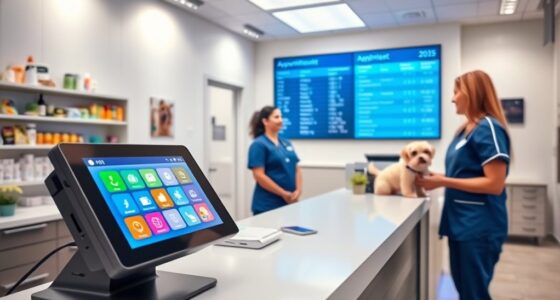Integrating your POS system with other business software can optimize operations by streamlining sales processes, automating data entry, and generating valuable reports for better decision-making. Challenges like technical issues and staff training can be managed by evaluating scalability, security needs, and integration options. Common applications like Square and CRM software streamline processes, while hardware options like terminals and scanners enhance efficiency. Industry-specific integrations, such as retail and restaurant connections, offer tailored solutions. POS platforms like Lightspeed and Vend provide diverse features to cater to different business needs. Discover more benefits by exploring the various integration options available.
Key Takeaways
- Evaluate software compatibility and system requirements.
- Ensure seamless data flow between POS and other systems.
- Prioritize real-time inventory visibility and synchronization.
- Optimize product information for accurate integration.
- Monitor and adjust integration continuously for optimal performance.
Benefits of POS System Integration
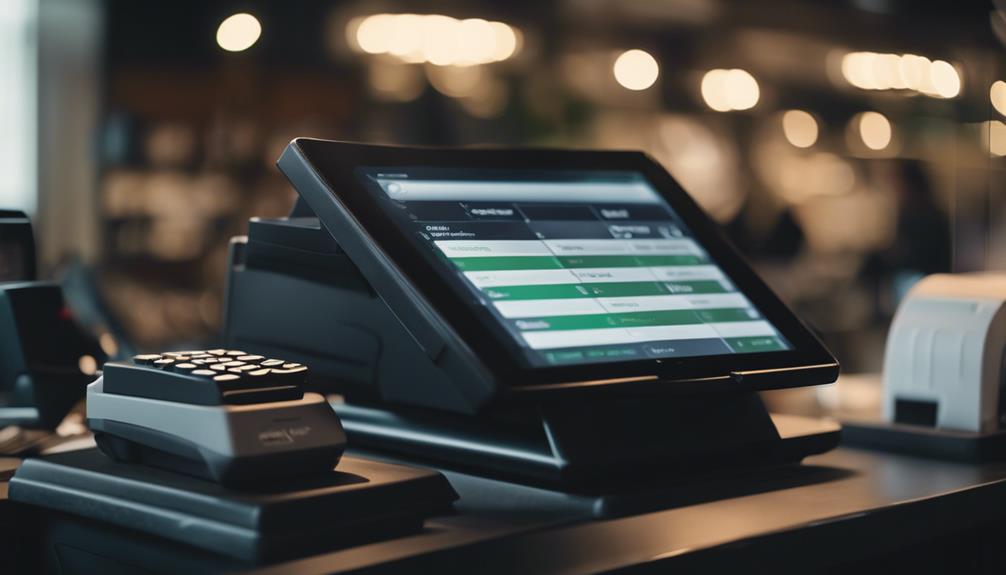
Wondering how integrating your POS system with other business software can revolutionize your operations and enhance customer satisfaction? POS system integration offers a wide range of benefits for your business. By seamlessly connecting your POS system with other software, you can streamline your sales process, manage inventory more efficiently, and automate data entry tasks. This integration not only saves you time but also reduces errors, leading to a smoother operation overall.
Furthermore, integrated POS systems empower you to leverage valuable POS data for targeted marketing campaigns and generate insightful reports that aid in strategic decision-making. The ability to centralize customer data and interactions by connecting your POS system with CRM software enhances customer service and fosters better customer retention.
Additionally, dashboards and visualizations created through POS system integration provide you with a detailed view of performance metrics, helping you identify growth opportunities and monitor your business's progress effectively. By combining POS data with other sources through integration, you can greatly enhance your operational efficiency, marketing effectiveness, and overall analytics capabilities.
Challenges in Integrating POS Systems

Integrating POS systems with other business software poses various challenges that can impact operational efficiency and data security. Technical issues in integrating your POS system can result in operational disruptions and compromise data security, highlighting the importance of seamless integration processes.
Training staff to effectively use the integrated systems and providing ongoing support are vital to guarantee successful implementation. Additionally, managing multiple vendors, contracts, and fees while ensuring compliance further adds complexity to the integration journey.
Matching wireless network capacity to peak demand is essential to prevent system lags and maintain operational efficiency, emphasizing the importance of thorough planning and infrastructure considerations. Integrating your POS system may also require additional hardware, software, or services, increasing the challenges faced in achieving a harmonious integration with online stores and accounting software.
Overcoming these obstacles demands meticulous attention to detail and a strategic approach to integration.
Choosing the Best Integration Options
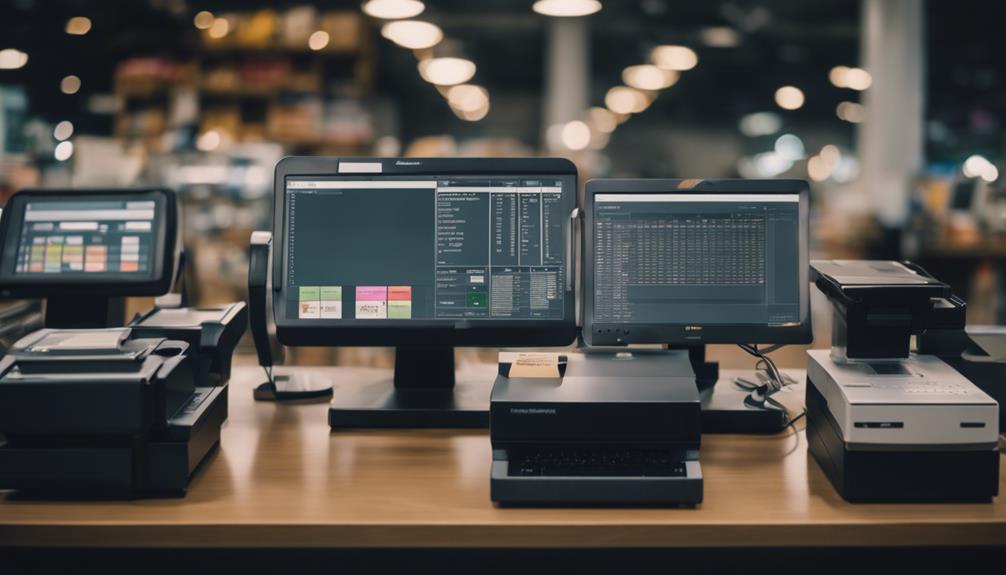
When selecting the best integration options for your business software, it's important to take into account the scalability and flexibility requirements of your current POS system and desired business systems. Evaluating the security and compliance needs of both your POS and business systems is vital when choosing integration solutions.
Additionally, consider how your integration needs might evolve as your business expands to guarantee long-term efficiency. Weigh the advantages and disadvantages of different integration options before making a decision that aligns with your business strategy.
Leveraging POS data through effective integrations can enhance operations, marketing campaigns, customer service, and analytics. Real-time PoS integration can streamline online retail operations, while ecommerce integrations can help manage online sales efficiently.
Common POS Integration Software Applications
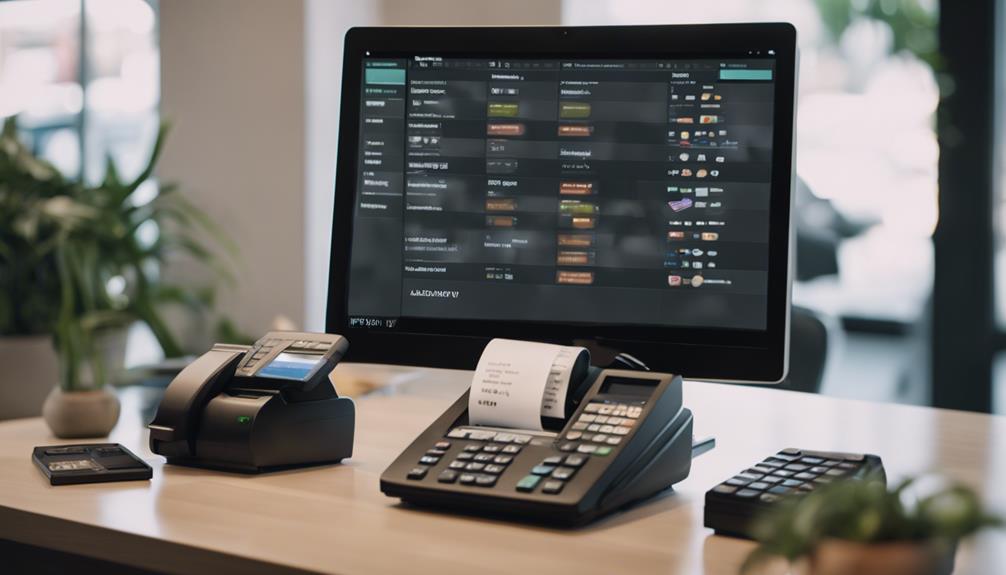
Consider utilizing popular POS integration software applications like Square, Stripe, PayPal, Braintree, and Adyen to optimize your business operations. These platforms offer seamless payment processing integration, ensuring secure and efficient transactions.
For effective inventory management and streamlined ordering processes, consider integrations like Unleashed Software.
To enhance customer interactions and data management, CRM integrations such as HubSpot, Salesforce, Zoho CRM, Freshsales, and Nimble can be invaluable.
Streamline your accounting and finance tasks with integrations like QuickBooks, Xero, FreshBooks, Wave, and Sage, which help in maintaining accurate financial records.
For employee management and scheduling, tools like 7shifts, Deputy, When I Work, and Homebase can assist in optimizing workforce efficiency.
Hardware Options for POS Integration
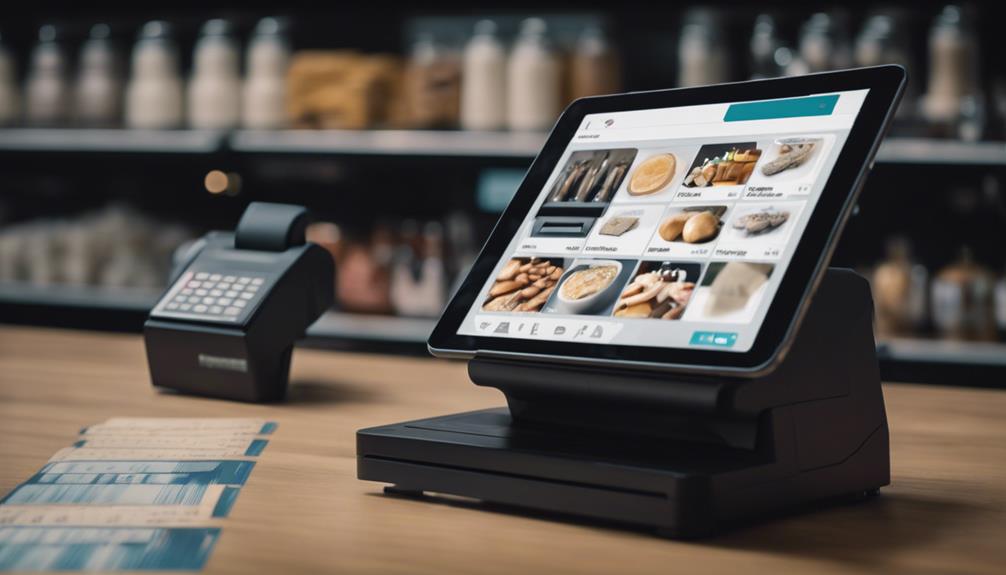
Select the appropriate POS hardware components to facilitate seamless communication and data flow between your POS system and other business software. Key hardware options for POS integration include terminals, credit card readers, cash drawers, barcode scanners, and additional displays.
Credit card readers play an important role in secure payment processing, while barcode scanners aid in inventory management by tracking products efficiently. Cash drawers guarantee proper cash handling procedures within the POS system. Additional displays can enhance customer interactions or provide real-time data visibility for staff, improving overall operational efficiency.
Industry-Specific POS Integrations
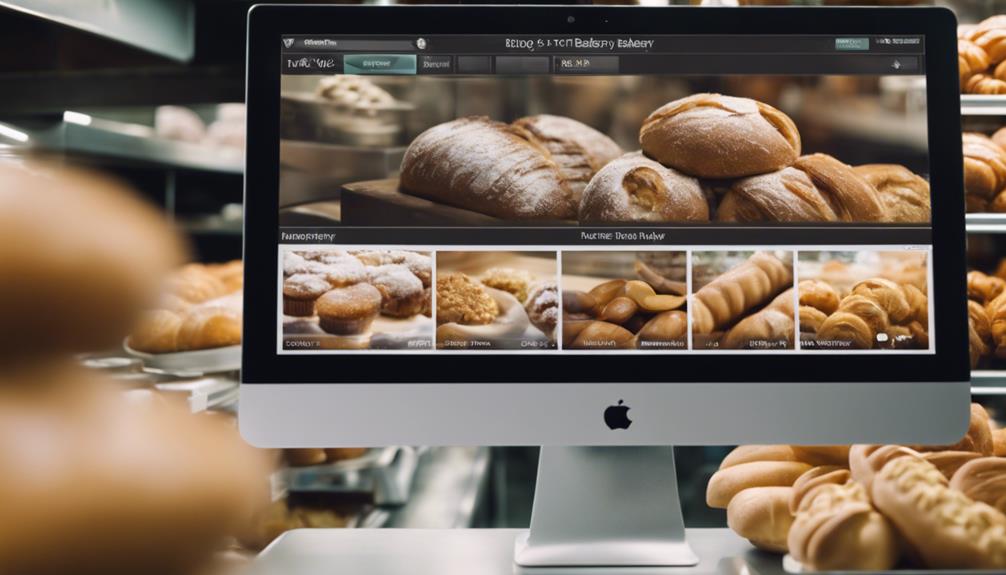
When it comes to industry-specific POS integrations, there are key aspects to take into account.
Retail businesses benefit from tailored POS systems, while restaurants require specialized POS connections for efficient operations.
The healthcare sector also relies on specific POS integrations to meet industry regulations and enhance patient care.
Retail-Specific POS Integrations
Retail-specific POS integrations offer tailored features such as gift card management, age verification, and loyalty programs to meet the specific needs of retail businesses. These integrations enable:
- Efficient inventory management
- Seamless omni-channel sales
- Enhanced customer engagement through personalized experiences
- Boosting sales with loyalty programs
Restaurant POS Connections
For restaurants, integrating POS systems with industry-specific software can streamline operations and enhance customer experiences. Menu management tools allow for seamless updates to offerings and prices. Kitchen display system integrations improve order accuracy and speed up food preparation, enhancing overall efficiency.
Booking and reservation integrations enable online reservations, reducing wait times and optimizing table management. Automatic tip calculations and distribution among staff members are simplified through tip management integrations. Additionally, restaurant discovery integrations can help promote the restaurant online and attract new customers through various platforms.
Healthcare Industry POS Integration
Integrating POS systems in the healthcare industry optimizes patient billing processes and enhances medical facility operations. Incorporating these systems offers several benefits:
- Streamlined patient billing processes and insurance claims.
- Accurate tracking of medical supplies and efficient inventory management.
- Seamless management of patient records, appointments, and prescriptions.
- Enhanced data security and compliance through integration with electronic health records (EHR) systems.
Healthcare POS integrations not only improve operational efficiency but also elevate the patient experience by enabling quick and secure payment processing for medical services. By leveraging these integrations, medical facilities can enhance their overall service delivery while ensuring data accuracy and security.
Popular POS Platforms for Integration

When seeking popular POS platforms for seamless integration with other business software, consider the capabilities of Shopify. Shopify is renowned for its ability to seamlessly connect with various ecommerce solutions, making it a top choice for businesses looking to streamline their operations.
Lightspeed POS is another robust option known for its versatility in integrating with different business software applications.
Square stands out for its diverse integration options, allowing for seamless connections with payment processing, inventory management, and analytics tools.
Clover POS boasts an extensive app marketplace, enabling users to easily enhance their system with additional functionalities.
Vend POS is recognized for its wide range of add-ons and integrations that can elevate retail operations and improve the overall customer experience.
These popular POS platforms offer a range of integration possibilities, catering to different business needs and enhancing efficiency across various industries.
E-Commerce POS Integration Benefits
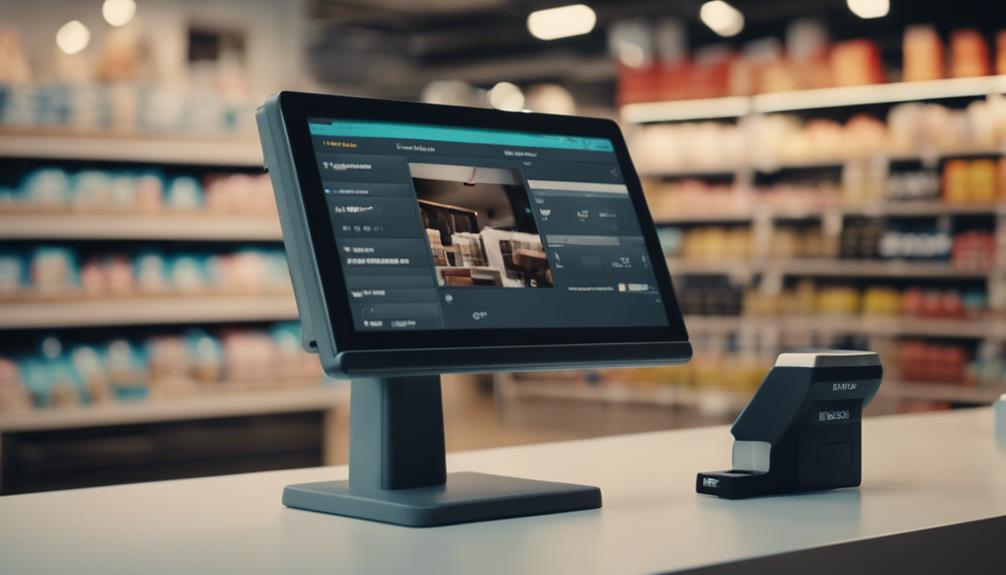
When integrating your e-commerce platform with your POS system, you can expect improved sales tracking, streamlined inventory management, and enhanced customer experience.
This integration allows for real-time synchronization of data, reducing manual errors and ensuring accurate inventory levels.
Improved Sales Tracking
Utilizing e-commerce POS integration enhances sales tracking capabilities, providing businesses with valuable insights into customer purchasing behaviors. This integration enables real-time monitoring of sales across various channels, allowing you to understand customer data better.
Here are some key benefits of enhanced sales tracking through e-commerce POS integration:
- Gain a holistic view of online ordering and offline sales data.
- Analyze sales trends and customer preferences for targeted marketing campaigns.
- Seamlessly sync inventory and sales data for better decision-making.
- Enhance customer satisfaction by personalizing promotions and experiences.
Streamlined Inventory Management
Streamlining inventory management through E-commerce POS integration greatly enhances operational efficiency and accuracy in stock tracking. By enabling real-time syncing of inventory data across various sales channels, businesses can prevent issues like overselling and stockouts.
This integration guarantees that stock levels are accurately reflected online and offline, leading to optimized product listings and descriptions. Additionally, seamless integration opens up opportunities for cross-channel promotions and discounts, boosting sales potential.
The access to customer insights from integrated systems further enhances CRM strategies and enables personalized marketing efforts. Overall, E-commerce POS integration not only simplifies inventory management but also provides a solid foundation for businesses to drive growth and improve overall operational effectiveness.
Enhanced Customer Experience
By integrating your E-commerce POS system with other business software, you can greatly enhance the overall customer experience through seamless transactions across both online and offline channels. Here are some key benefits of integrating your E-commerce POS system:
- Real-time inventory visibility prevents over-selling and improves order fulfillment.
- Cross-channel promotions and discounts can be seamlessly enabled through integration.
- Customer insights gathered from integrated systems improve CRM strategies.
- Integrated POS systems connect offline hardware with online stores, optimizing sales operations and customer interactions.
Integrating your systems not only streamlines processes but also allows for tailored marketing campaigns that enhance customer satisfaction and loyalty.
Steps for POS and E-Commerce Integration
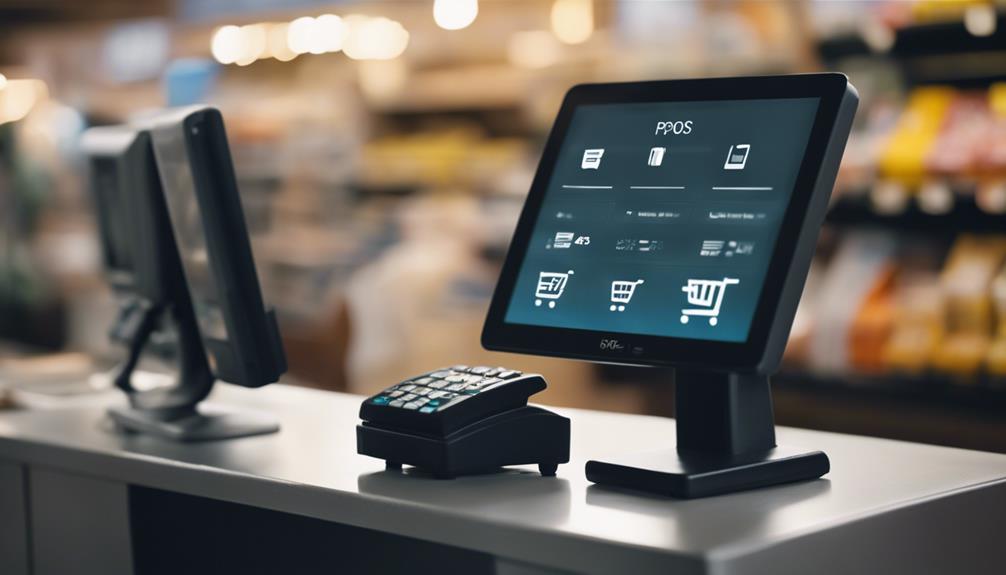
To successfully integrate your POS system with your e-commerce platform, begin by evaluating the compatibility and requirements of both systems. Make sure that your POS provider supports integration with your chosen e-commerce solution to facilitate seamless operations.
Set up and synchronize the systems to enable smooth data flow between your point of sale (POS) and online channels. This integration is vital for enhancing customer relationship management (CRM) and optimizing data management across your business applications.
Real-time inventory visibility is key to preventing over-selling and facilitating cross-channel promotions, ultimately improving the customer experience. Post-integration, it's important to optimize product descriptions and images for consistency across platforms.
Continuously monitor and adjust the integration to enhance performance and efficiency. By following these steps and maintaining a keen focus on inventory visibility and data consistency, you can streamline your operations and provide a more cohesive experience for your customers.
Evaluating the Need for POS Integration

Assessing the current limitations of your POS system in managing inventory, sales data, and customer information is crucial when evaluating the need for POS integration with other business software. Integrating your POS system with other business software can lead to efficiency gains, operational improvements, enhanced customer management, and better inventory management.
To help you evaluate the need for integration, here are some key points to ponder:
- Evaluate the efficiency gains and operational improvements possible with integrated POS systems.
- Identify specific pain points in your current workflow that could be addressed through integration.
- Assess the potential for enhancing customer service and data accuracy with integrated systems.
- Determine the ROI of POS integration by analyzing time saved, errors reduced, and revenue generated through streamlined operations.
Frequently Asked Questions
How Do You Integrate a POS System?
To integrate a POS system, you typically connect it with other business software using methods like APIs, webhooks, or file-based transfers. This process enables seamless data exchange and enhances operational efficiency.
By synchronizing inventory, sales data, customer details, and financial transactions in real-time, you can streamline business processes.
Selecting the right integration method and ensuring system compatibility are essential for successful POS integration.
Does POS Nation Integrate With Quickbooks?
Yes, POS Nation seamlessly integrates with QuickBooks. This integration automates syncing of sales, inventory, and financial data, enhancing efficiency and accuracy.
By eliminating manual data entry, you can streamline your financial processes and make informed decisions. This cohesive system offers a seamless solution for managing sales and accounting tasks.
Improve your workflow and maintain accurate financial records with POS Nation's integration with QuickBooks.
What Is an Integrated Point-Of-Sale System?
An integrated point-of-sale system is a software solution that connects your POS system with other business applications, facilitating seamless data exchange. It allows real-time communication between POS terminals and systems like CRM, inventory management, and accounting software.
This integration streamlines operations, automates processes, and enhances accuracy in sales data. By linking your POS system with other software, you can improve customer service, track performance, and make informed decisions based on exhaustive data insights.
What Is POS Linked To?
POS systems are linked to various business software to enhance functionality. They are connected to:
- Accounting software for financial management,
- Inventory systems for stock tracking,
- CRM software for customer data organization,
- Payment processing systems for transactions, and
- Employee management software for scheduling and payroll.
Conclusion
To sum up, integrating POS systems with other business software can streamline operations and improve efficiency. However, addressing the challenges and selecting the best integration options requires careful consideration. Modern POS systems are designed to be flexible and customizable, allowing for seamless integration with other software such as inventory management, accounting, and customer relationship management. By connecting these systems, businesses can gain real-time insights and improve decision making. Ultimately, the investment in integrating POS systems with other business software can lead to cost savings and improved overall performance.
By assessing the need for integration and choosing the appropriate tools and hardware, businesses can benefit from a seamless and connected system. Remember, when it comes to POS integration, the key is to choose wisely and plan ahead for success in your business operations.



